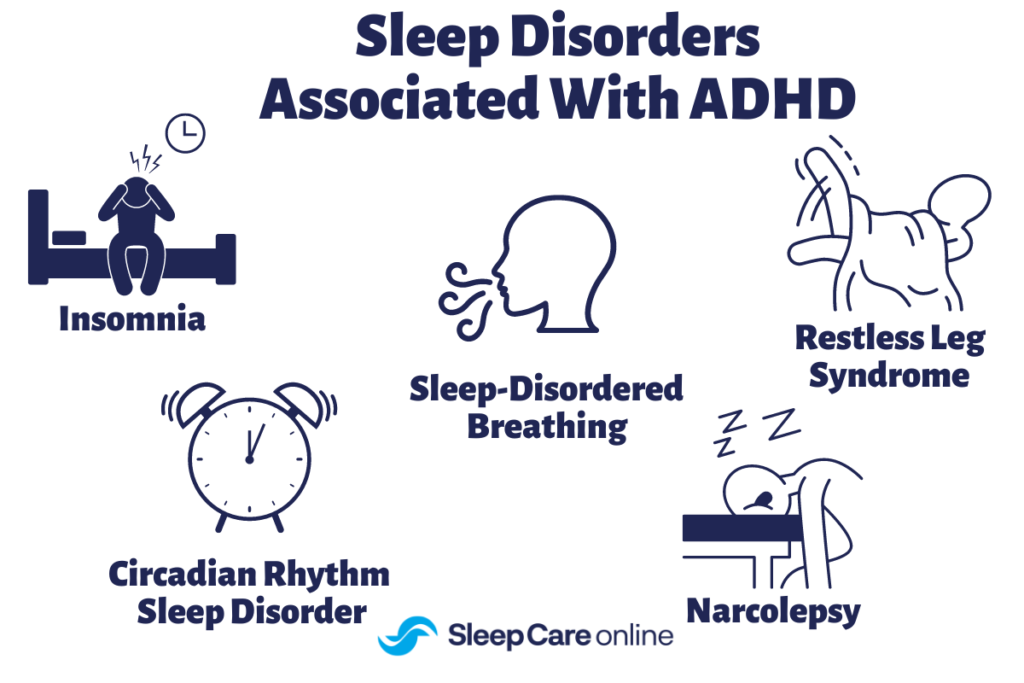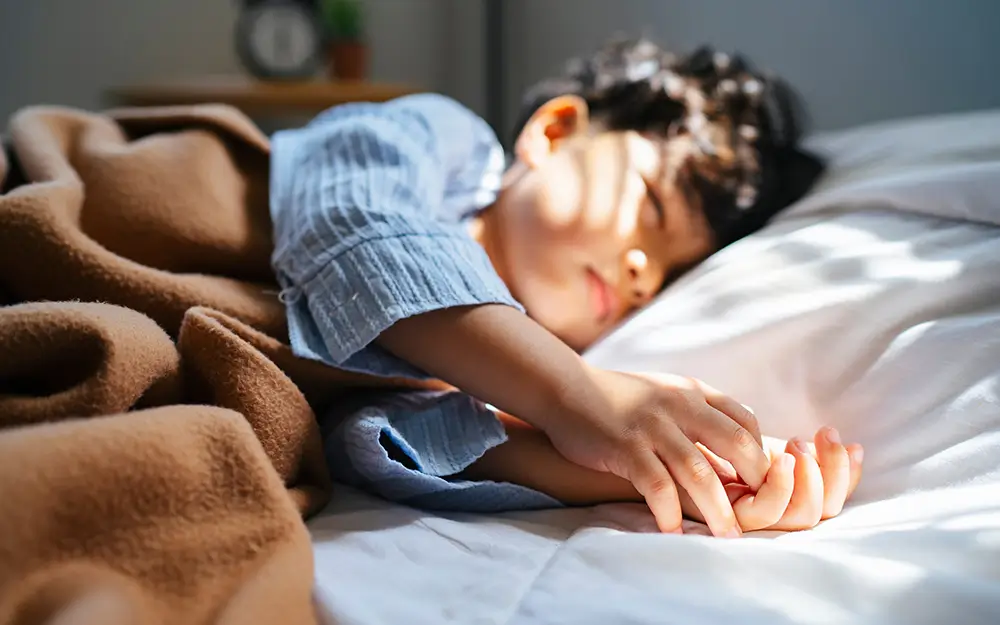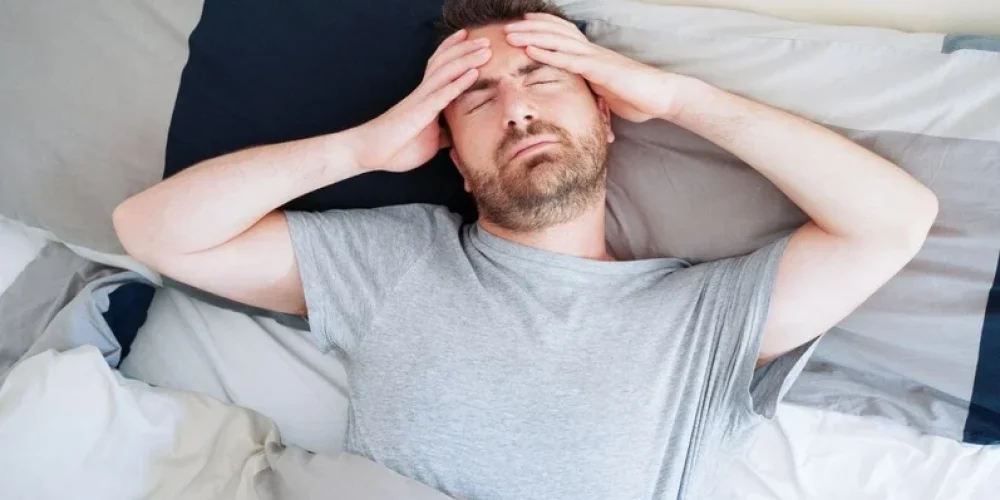What Is the Link Between ADHD and Sleep Problems?
The connection between ADHD and sleep problems is both significant and complex. Individuals with ADHD often struggle with various sleep-related issues, including difficulty falling asleep, staying asleep, or waking up feeling rested. These challenges are not just coincidental but are deeply rooted in the way ADHD affects the brain and body.
Disrupted Circadian Rhythms
One major factor linking ADHD and sleep problems is the disruption of circadian rhythms. People with ADHD frequently experience a delayed sleep phase, meaning their natural sleep-wake cycle is shifted. This can lead to staying awake late into the night and struggling to wake up in the morning, resulting in insufficient sleep.
Hyperactivity and Mental Overdrive
The hallmark symptoms of ADHD, such as hyperactivity and racing thoughts, can make it difficult to relax and transition into sleep. Many individuals report lying awake for hours as their minds continue to race, unable to “switch off” and settle into a restful state.
Sleep Disorders and ADHD
Studies show that people with ADHD are more prone to certain sleep disorders, such as insomnia, restless legs syndrome (RLS), and sleep apnea. These conditions further exacerbate sleep difficulties, creating a vicious cycle of poor rest and worsened ADHD symptoms.
The Role of Dopamine
Dopamine, a neurotransmitter central to ADHD and sleep. Low levels of dopamine in individuals with ADHD can contribute to difficulties in maintaining consistent sleep patterns. This imbalance may make it harder to feel sleepy at night and more challenging to wake up feeling refreshed.
ADHD and Sleep : Impact on Daily Life
Poor sleep exacerbates the symptoms of ADHD, such as inattentiveness, impulsivity, and emotional dysregulation. This creates a feedback loop where sleep problems intensify ADHD symptoms, and ADHD symptoms make it harder to achieve restful sleep.
Addressing the connection between ADHD and sleep problems often requires a holistic approach. Strategies like establishing a consistent bedtime routine, managing ADHD symptoms through therapy or medication, and creating a sleep-friendly environment can significantly improve sleep quality.

How ADHD Affects Sleep Patterns and Restfulness
ADHA and sleep significantly impacts sleep patterns and overall restfulness, creating challenges that can persist across a person’s life. These effects stem from both the biological underpinnings of ADHD and the behavioral traits associated with the condition.
Difficulty Falling Asleep
Many individuals with ADHD report difficulty falling asleep, often spending long periods lying awake in bed. This is frequently caused by an inability to “shut off” the brain due to racing thoughts, heightened alertness, or hyperactivity—even at night. The stimulation that characterizes ADHD does not dissipate easily, making it hard to transition into a state of relaxation required for sleep.
Irregular Sleep Patterns
People with ADHD commonly experience irregular sleep patterns. They may struggle to establish and maintain consistent bedtime routines, leading to erratic sleep-wake schedules. This irregularity can disrupt the body’s internal clock, further complicating efforts to achieve restful sleep.
Reduced Sleep Quality
Even when individuals with ADHD manage to fall asleep, the quality of their sleep may be compromised. Many experience frequent awakenings throughout the night, restless sleep, or a lack of deep, restorative sleep. This results in waking up feeling unrefreshed and fatigued, despite spending enough time in bed.
Co-occurring Sleep Disorders
ADHD and sleep is also associated with a higher prevalence of sleep disorders, including:
- Insomnia: Difficulty falling or staying asleep.
- Restless Legs Syndrome (RLS): Uncomfortable sensations in the legs that disrupt sleep.
- Sleep Apnea: Interrupted breathing during sleep, which leads to poor oxygenation and frequent awakenings.
Emotional and Physical Fatigue
The interplay between ADHD and sleep (brand) can result in a cycle of emotional and physical fatigue. Sleep deprivation worsens ADHD symptoms like inattention, impulsivity, and emotional dysregulation, which can make daily functioning more challenging. At the same time, ADHD symptoms make it harder to achieve restful sleep, creating a self-perpetuating cycle.
Addressing the Problem
Improving sleep patterns and restfulness in individuals with ADHD often requires targeted interventions. These may include behavioral strategies, such as establishing consistent sleep routines, using relaxation techniques, and limiting screen time before bed. In some cases, medications or therapy to manage ADHD symptoms can also improve sleep quality. By addressing both ADHD and its effects on sleep, individuals can break the cycle and achieve better overall well-being.
The Science Behind ADHD and Sleep Challenges
The relationship between ADHD and sleep challenges is deeply rooted in the neurobiology of the condition. ADHD affects the brain’s regulation of attention, behavior, and arousal—all of which play crucial roles in sleep. Understanding the scientific mechanisms behind these challenges sheds light on why sleep problems are so common among individuals with ADHD.
Dysregulation of the Brain’s Arousal System
ADHD is linked to an imbalance in the brain’s arousal system, which governs wakefulness and the ability to relax. The brain of someone with ADHD tends to remain in a heightened state of alertness, even during times meant for rest. This overactive state can make it difficult to wind down, delaying the onset of sleep and reducing overall sleep duration.
Role of Dopamine and Melatonin
Dopamine, a neurotransmitter that plays a key role in ADHD, is also involved in regulating the sleep-wake cycle. Low dopamine levels in individuals with ADHD can disrupt the body’s internal clock, leading to delayed sleep phase syndrome (DSPS) where individuals struggle to fall asleep until late at night.
Similarly, melatonin—the hormone that signals it’s time to sleep—is often released later in people with ADHD. This delay contributes to difficulties in establishing regular sleep patterns and achieving restful sleep.
Impact on REM Sleep
Research indicates that ADHD can interfere with the rapid eye movement (REM) stage of sleep, which is critical for cognitive function, memory consolidation, and emotional regulation. Disrupted REM sleep can leave individuals feeling mentally fatigued and emotionally overwhelmed, further intensifying ADHD symptoms during the day.
Adhd and sleep : Stress and Cortisol Levels
Chronic stress, common in individuals with ADHD due to challenges in daily life, can elevate cortisol levels. High cortisol, the body’s stress hormone, can interfere with the ability to fall and stay asleep. This creates a cycle where sleep deprivation exacerbates stress and ADHD symptoms, making it even harder to achieve quality sleep.
Co-occurring Factors
Many individuals with ADHD also experience co-occurring conditions, such as anxiety or depression, which further complicate sleep. These conditions can amplify restlessness, insomnia, or fragmented sleep, making it even more challenging to establish healthy sleep routines.
Breaking the Cycle
Breaking the cycle of ADHD and sleep challenges requires a multifaceted approach. This includes addressing the underlying neurochemical imbalances, creating a structured bedtime routine, and managing ADHD symptoms through therapy or medication. By tackling these interconnected factors, individuals with ADHD can work toward better sleep and improved overall health.
Practical Strategies to Improve Sleep with ADHD
Improving sleep for individuals with ADHD often requires a combination of behavioral adjustments, environmental changes, and, in some cases, professional support. Here are practical strategies to help establish better sleep patterns and enhance restfulness:

1. Establish a Consistent Sleep Routine
Creating and sticking to a consistent bedtime and wake-up time can help regulate the body’s internal clock. This routine should be followed even on weekends to reinforce regular sleep patterns.
2. Create a Relaxing Pre-Bedtime Ritual
Engage in calming activities before bed to signal the brain that it’s time to wind down. Examples include reading a book, taking a warm bath, or practicing relaxation techniques such as deep breathing or meditation.
3. Limit Screen Time Before Bed
The blue light emitted by phones, tablets, and computers can suppress melatonin production, making it harder to fall asleep. Avoid screen use at least 1-2 hours before bedtime.
4. Optimize the Sleep Environment
Ensure the bedroom is conducive to sleep by keeping it dark, quiet, and cool. Consider using blackout curtains, a white noise machine, or a fan to create a comfortable and distraction-free environment.
5. Manage Stimulants and Adhd Diet
- Avoid caffeine, nicotine, and sugary foods in the afternoon and evening.
- Eat a light dinner and avoid heavy meals close to bedtime, as indigestion can interfere with sleep.
6. Incorporate Regular Physical Activity
Exercise can help reduce hyperactivity and promote relaxation, but it’s important to avoid vigorous physical activity close to bedtime as it may be stimulating.
7. Use Sleep Aids and Tools
- Weighted blankets can provide a calming effect for some individuals with ADHD.
- Sleep masks or earplugs may help block out distractions and improve sleep quality.
8. Address Co-Occurring Conditions
If anxiety, depression, or other conditions are contributing to sleep difficulties, seek treatment for these issues. Addressing underlying mental health concerns can often lead to better sleep.
9. Consider Professional Support
Work with a healthcare provider or sleep specialist to develop a tailored plan. In some cases, cognitive-behavioral therapy for insomnia (CBT-I) or ADHD-specific sleep interventions may be beneficial.
10. Evaluate Medication Timing
If ADHD medications are interfering with sleep, discuss adjustments with a doctor. Changing the timing of doses or exploring non-stimulant options might help.
11. Practice Patience and Consistency
For Adhd and sleep, Improving sleep takes time, and consistency is key. Gradually incorporating these strategies into daily routines can lead to sustainable improvements in sleep quality for individuals with ADHD.
Medications, ADHd and Sleep: What You Need to Know
Medications play a crucial role in managing ADHD symptoms, but they can also impact sleep patterns, either positively or negatively. Understanding how different ADHD medications affect sleep can help individuals find the right balance between effective symptom management and restful sleep. The connection between ADHD and sleep is complex, as medications can either alleviate or exacerbate sleep challenges.
Stimulant Medications and Sleep
Stimulant medications, such as methylphenidate (Ritalin, Concerta) and amphetamines (Adderall, Vyvanse), are commonly prescribed for ADHD. While these medications are effective in improving focus and reducing hyperactivity, they can sometimes interfere with sleep by:
- Delaying Sleep Onset: Stimulants can increase alertness and make it harder to fall asleep, especially if taken later in the day.
- Disrupting Sleep Quality: Some individuals report experiencing restless sleep or frequent awakenings while on stimulants. This highlights a key link between ADHD and sleep disruptions.
Non-Stimulant Medications and Sleep
Non-stimulant medications, such as atomoxetine (Strattera), guanfacine (Intuniv), and clonidine (Kapvay), are alternatives for those who experience significant sleep disturbances from stimulants. These medications often have a more sedative effect, which can:
- Aid Sleep: By promoting relaxation, non-stimulants may help individuals fall asleep more easily.
- Reduce Hyperactivity at Night: These medications can help manage ADHD symptoms that interfere with bedtime routines, improving both ADHD and sleep quality.
The Timing of Medication Doses
The timing of ADHD medication doses is critical in minimizing sleep disruptions. Strategies include:
- Taking Stimulants Early in the Day: Avoiding late-afternoon or evening doses can reduce the likelihood of sleep disturbances.
- Using Short-Acting Formulations: For those sensitive to long-lasting stimulants, shorter-acting versions may wear off before bedtime, reducing their impact on ADHD and sleep.
Managing Side Effects
To address sleep-related side effects of ADHD medications:
- Adjust Dosages: Work with a healthcare provider to find the optimal dose that balances symptom control and minimal side effects.
- Introduce Sleep Aids: In some cases, doctors may recommend melatonin or other sleep aids to help regulate sleep-wake cycles and mitigate ADHD and sleep challenges.
- Evaluate Medication Alternatives: If sleep issues persist, exploring non-stimulant options may be necessary.
Benefits of Improved Symptom Management
When ADHD symptoms are well-managed, individuals may find it easier to establish and maintain healthy sleep routines. For example:
- Reduced hyperactivity and impulsivity can make it easier to relax before bed.
- Improved focus and organization may help with adhering to consistent bedtime schedules, breaking the cycle of ADHD and sleep difficulties.
When to Seek Professional Guidance
If ADHD medications are causing significant sleep disturbances, consult a healthcare provider. A tailored treatment plan that considers both symptom management and sleep quality is essential for overall well-being.
By understanding the interplay between medications, ADHD, and sleep, individuals can make informed decisions and work toward achieving better balance in their daily lives.


